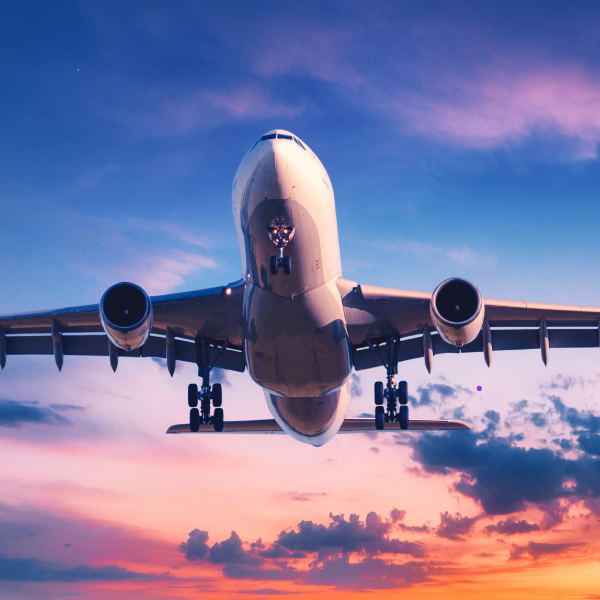Claiming VAT in aviation
Explore the reclaim opportunities available within the industry
When it comes to VAT reclaim in the aviation industry, the reclaim process can get so murky that many aerospace companies recover only a fraction of what they can rightfully claim....

Explore the reclaim opportunities available within the industry
When it comes to VAT reclaim in the aviation industry, the reclaim process can get so murky that many aerospace companies recover only a fraction of what they can rightfully claim. Moreso, many companies in the aviation sector are unaware of hidden VAT that could be added to common expenses such as fuel, even though they are technically classified as ‘exempt.’ Is your business falling victim to significant VAT leakage? Probably. Is there a way to tap into the refund yield without burning through fuel and critical team members? Definitely!
So, how can businesses in the aviation industry tap into their significant reclaim opportunities without getting caught in the web of complex and difficult-to-manage multinational, cross-border tax strategies? The first step? Understanding the impact of VAT on your aviation business and what you can rightfully claim on local and international taxes.
First order of business? Establishing the groundwork.
Domestic vs Foreign VAT
Although the VAT landscape is known for its complexity, it can be approached by categorizing it into two overarching types; domestic and foreign. The type of VAT process and recovery solution that applies to specific expenses is determined by where the expense took place. In a nutshell, domestic and foreign VAT entail the following.
Domestic VAT |
Foreign VAT |
| Domestic VAT, or local VAT, processes apply to all goods and services that incur VAT within the country where you are VAT-registered. This is often referred to as input VAT and can include multiple countries (if VAT-registered within the country). |
Foreign VAT includes expenses that occur outside of a company’s VAT-registered domain. It allows non-residents to claim the VAT portion on international business invoices and expenses without needing to become VAT-registered within the country. |
Who can recover VAT in Aviation?
The VAT reclaim scope within aviation is enormous, and the indirect tax opportunities are fruitful. However, for many smaller aviation businesses, such as private charters, maximizing their VAT refund yield is an overwhelming and resource-intensive process, especially considering that most of the reclaim yield lies in foreign operations. In addition, commercial carriers and aviation companies may be VAT-registered all around the world, but common local VAT reclaim opportunities and deadlines need to be corrected. Needless to say, the processes are demanding, making it critical to check your eligibility criteria before investing in the reclaim process.
So, before diving into the deep end of VAT recovery in Aviation, let’s look at who can recover VAT in Aviation in the first place.
Commercial AirlinesCommercial airlines can reclaim VAT on both local and international eligible expenses. This includes VAT incurred on fuel, MRO, ground handling services, and input VAT. |
Charter operatorsBusinesses operating charter or private flights have significant foreign VAT exposure and often include VAT incurred on fuel (even when exempt), ground handling, and other eligible expenses. |
Aircraft leasing companies Companies that offer aircraft leasing or rental services may have local and domestic VAT exposure. Generally, this includes VAT charged on the management of their aircraft fleet as well as additional costs such as MRO and insurance. |
Maintenance and Repair Organizations (MROs):MRO companies also incur significant VAT on various business expenses that may be VAT recoverable. This includes VAT charged on equipment, tools, consumables, and other required inputs needed for MRO activities. |
Ground handling service providersAlthough ground handling costs are often VAT recoverable, this doesn’t exclude the service providers from significant reclaim opportunities themselves. Businesses providing ground handling services such as baggage handling, aircraft cleaning and other services may be eligible to reclaim the VAT portion on their VAT expenses. |
Aviation training institutionsAcademic or educational institutions offering aviation training or related courses can potentially reclaim VAT on eligible expenses such as instructional materials, equipment and more. |
Domestic VAT recovery in the Aviation industry
Most businesses are well familiar with the process of recovering their input VAT. However, as companies scale, they are often required to become VAT-registered in multiple countries. Administering and maximizing various VAT registrations can prove challenging, regardless of company size, and frequently leads to common pitfalls such as overclaiming and underclaiming local VAT - ultimately resulting in damaging financial loss and potential fines. Here’s what you need to know.
Overclaiming |
Underclaiming |
| As each local VAT jurisdiction is subject to its own VAT rates and regulations, the list of eligible expenses can easily vary. Due to this, companies often run the risk of including non-deductible expenses in their local VAT returns that may have been eligible in another country but not in another. This not only leads to rejected claims, but also exposes the business to possible audits, fines and penalties. |
Another common speed bump that keeps businesses from fully maximizing their reclaim potential is when they unknowingly underclaim VAT on eligible expenses. This is often due to insufficient data or unidentified VAT opportunities, ultimately keeping them from maximizing the input VAT refunds available for recovery, causing significant savings to slip through the cracks. |
Administer and maximize your returns with VAT IT
Rather than settle for rejected claims or underutilized savings opportunities, businesses can tap into our centralized domestic VAT solution, specifically designed for high-volume invoices across multiple countries. Leverage our vast network and relationships with local VAT authorities, field experts and tech to ensure that you’re fully compliant with local regulations while maximizing your return potential.
Foreign VAT recovery in Aviation
What is Foreign VAT?
Foreign VAT, or international VAT, is the value-added tax charged on most goods and services worldwide. Although your business may not be VAT-registered in the relevant country, VAT is still incurred on most costs. However, if these business expenses are eligible for VAT reclaim, you can rightfully recover the costs incurred as a non-resident. However, the foreign VAT reclaim process hinges on a plethora of country-specific VAT legislations, deadlines, rules, rates and industry-specific schemes, making it challenging to maintain compliance and maximize the reclaim potential. Regardless, despite best efforts, many organizations recover only a fraction of what they can rightfully reclaim, simply due to missed exposure opportunities. Here are some of the most significant recoverable costs within the foreign VAT recovery process.
Foreign VAT reclaim opportunities in Aviation
Ground handling costs
Ground handling costs are a typical VAT recoverable expense within the aviation industry. However, these costs aren’t always incurred within your local VAT-registered country. Therefore, these ground handling costs often go unreclaimed upon landing and departing from a foreign country as a non-resident business. These costs, however, may be eligible for VAT reclaim and can include related expenses such as baggage handling, ramp services, aircraft cleaning, and ground support equipment.
Testing of aircraft, components, and systems
Foreign VAT is incurred when conducting tests on aircraft and relevant components and systems in a foreign jurisdiction. Activities exposed to foreign VAT may include a variety of aspects, such as performance testing, safety testing, certification testing, or quality assurance testing. The specific types of tests and the scope of activities can vary depending on the nature of the aircraft, components, or systems being tested. However, they may be eligible for VAT recovery in certain foreign jurisdictions. Typical expenses include consumables, materials, and chemicals used during testing, costs related to generating reports, and any other relevant third-party testing services, instruments, or equipment.
Meetings, events, conferences, conventions & trade shows
Companies operating in the aviation industry spend significant amounts attending meetings, events, conferences, conventions & trade shows worldwide. The costs incurred during these events are frequently VAT recoverable and categorized as MICE (meetings, incentives, Conferences, and Exhibitions) spend. MICE expenses are common international business expenses, and while the recoverability may vary depending on the country, a business can generally reclaim the VAT portion incurred on the venue or booth rental, stand construction, promotional materials, attendance fees, transport costs, and accommodation expenses.
Tooling costs
Specialized tools and custom molding solutions are essential in the aviation industry, especially regarding MRO. For that reason, maximizing the VAT recovery on these items becomes vital. If you own tooling machinery used to produce specialized parts and components for export, the VAT incurred on tools, molds, casts, and cradles is often reclaimable, making it possible to cut tooling expenses by up to 27%.
Employee Travel Related Expenses
Both private and commercial flight crews landing and departing in foreign countries where they are not VAT-registered often incur local VAT. These travel and entertainment (“T&E”) costs are for business purposes and are therefore recoverable through foreign refund directives. Common eligible expenses include accommodation, meals, local transport, mobile phone charges, and more.
Additional high-value expenses that are VAT recoverable
- Supply and install costs.
- Delivery of spares or replacement parts.
- Research and development costs.
- Testing facility rental costs
- Maintenance costs.
- Engineering, recruitment, R&D, and other consulting services
How to calculate the VAT refund potential for your business
Calculating your VAT refund potential may involve several steps, including:
- Determining eligibility.
- Checking where you are VAT registered to determine the recovery type.
- Collecting data and gathering all eligible expenses, invoices, and supporting documentation.
- Calculating recoverable VAT based on country-specific VAT rates.
- Considering any applicable VAT exemptions and restrictions.
- Applying any cross-border VAT Rules, such as rules related to services received, place of supply, or reverse charge mechanisms.
Alternatively, you can leave the heavy lifting to us and allow us to do a VAT health check on your behalf.
How can VAT IT help land maximized VAT returns?
Recover the maximum amount of VAT savings for your charter business or commercial carriers with a single point of contact for all tax-related issues in the Aviation industry. The VAT IT team has unparalleled experience in aviation tax and compliance. It combines state-of-the-art tech with human expertise to ensure that you tap into VAT reclaim opportunities while complying with all related domestic and international VAT legislation, deadlines, and instructions.
Pilot maximized VAT savings with VAT IT.
Related blogs
VAT refund Tool kit
Contact Us
Come explore your refund possibilities.
Chat with us today.
Find out how you could turn company spend into income




